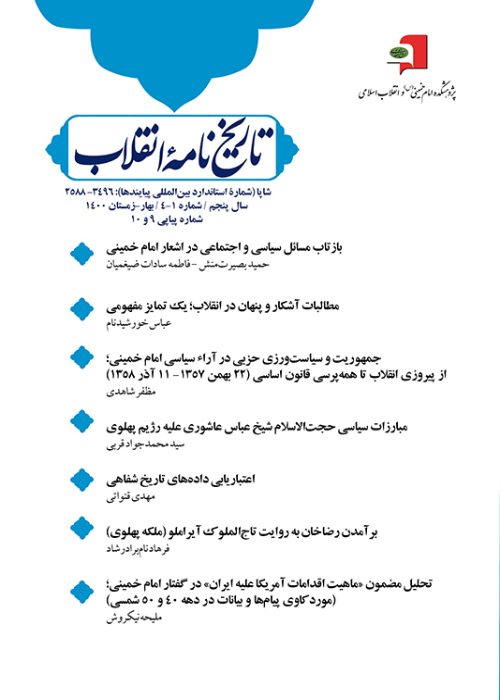Capitulation and Breach of National Sovereignty: A Comparative Study of Amir Kabir, Mosadeq and Imam Khomeini's Political Approaches
Author(s):
Article Type:
Research/Original Article (بدون رتبه معتبر)
Abstract:
Capitulation (relinquishing jurisdiction within a states borders over the subjects of a foreign state) means immunity of foreigners from prosecution according to the law of the host country. The imposition of this legal regime is an indication of the surrender of the weak state to the foreign powers. After the second round of Iran-Russia wars, the conclusion of the Treaty of Turkmenchay paved the ground for formation of a particular definition of capitulation in Qajar-era practical politics in Iran. The implementation of this legal regime caused various adverse political, social and cultural consequences for the country. The significance of capitulation in Iranian political structure lies in breach of the countrys national sovereignty. Two preconditions were required for a foreign national residing in Iran to enjoy this immunity in the host country: 1- Law and sanctions; 2- The existence of a power based on which the national rights would be accepted by the beneficiary states. With respect to the impact of capitulation on understanding of the foreign nationals of the judiciary structure, sovereignty and political power of the host country, the statesmen provided a clear-cut definition of national sovereignty and embarked on determination of the limits of codified laws to defend the law against abuse by foreign nationals, who were believed to undermine the authority of the sovereign state and ignore national independence. To that end, and to understand about political understandings of capitulation, this paper has paid attention to the reactions by three political personalities in different situations to capitulation: Amir Kabir the chancellor of Naseraddin Shah of Qajar Dynasty, Mosadeq prime minister during the period marked for nationalization of Iranian oil industry, and Imam Khomeini an outstanding opponent to and critic of granting the right of capitulation as a government bill in the course of Shah's so-called The White Revolution. This paper has been developed based on a comparative study in such a way that ideas and perspectives of the three personalities namely Amir Kabir, Mosadeq and Imam Khomeini as well as their understanding of capitulation have been analyzed. This paper poses a central question: In view of the three personalities, how do capitulation and breach of the national sovereignty affect Iran's political position and its foreign relations with other countries?
Keywords:
Language:
Persian
Published:
Journal of Tarikhname-Ye Enghelab, Volume:1 Issue: 2, 2018
Pages:
155 to 180
magiran.com/p1838184
دانلود و مطالعه متن این مقاله با یکی از روشهای زیر امکان پذیر است:
اشتراک شخصی
با عضویت و پرداخت آنلاین حق اشتراک یکساله به مبلغ 1,390,000ريال میتوانید 70 عنوان مطلب دانلود کنید!
اشتراک سازمانی
به کتابخانه دانشگاه یا محل کار خود پیشنهاد کنید تا اشتراک سازمانی این پایگاه را برای دسترسی نامحدود همه کاربران به متن مطالب تهیه نمایند!
توجه!
- حق عضویت دریافتی صرف حمایت از نشریات عضو و نگهداری، تکمیل و توسعه مگیران میشود.
- پرداخت حق اشتراک و دانلود مقالات اجازه بازنشر آن در سایر رسانههای چاپی و دیجیتال را به کاربر نمیدهد.
دسترسی سراسری کاربران دانشگاه پیام نور!
اعضای هیئت علمی و دانشجویان دانشگاه پیام نور در سراسر کشور، در صورت ثبت نام با ایمیل دانشگاهی، تا پایان فروردین ماه 1403 به مقالات سایت دسترسی خواهند داشت!
In order to view content subscription is required
Personal subscription
Subscribe magiran.com for 70 € euros via PayPal and download 70 articles during a year.
Organization subscription
Please contact us to subscribe your university or library for unlimited access!


